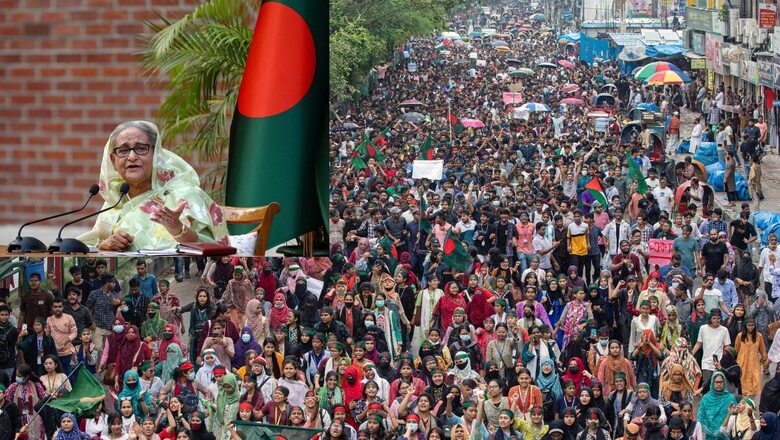
views
At least 100 people were killed in fresh clashes in Bangladesh that began on Sunday between ruling party supporters and protesters demanding Prime Minister Sheikh Hasina’s resignation.
This latest bout of violence has raised the death toll from anti-government protests to 300. Bangladeshi security forces patrolled the capital on Monday as protesters demanding Hasina’s resignation said they would take to Dhaka’s streets again following the deadliest day of unrest since demonstrations erupted last month.
In response to the unrest, the government cut off mobile internet and imposed an indefinite nationwide curfew. Additionally, a three-day general holiday was announced for Monday, Tuesday, and Wednesday. The new clashes erupted when protesters, part of a non-cooperation program organized by Students Against Discrimination, demanded the government’s resignation over a job quota system. They faced opposition from supporters of the Awami League.
Fresh Clashes
Hundreds of people were also injured in clashes, shootings and counter-chases across the country surrounding the non-cooperation program, according to local media. According to the police headquarters, 14 policemen have been killed across the country. Of them, 13 were killed in Sirajganj’s Enayetpur police station. One person was killed in Comilla’s Elliotganj, the paper said. More than 300 policemen were injured, it added.
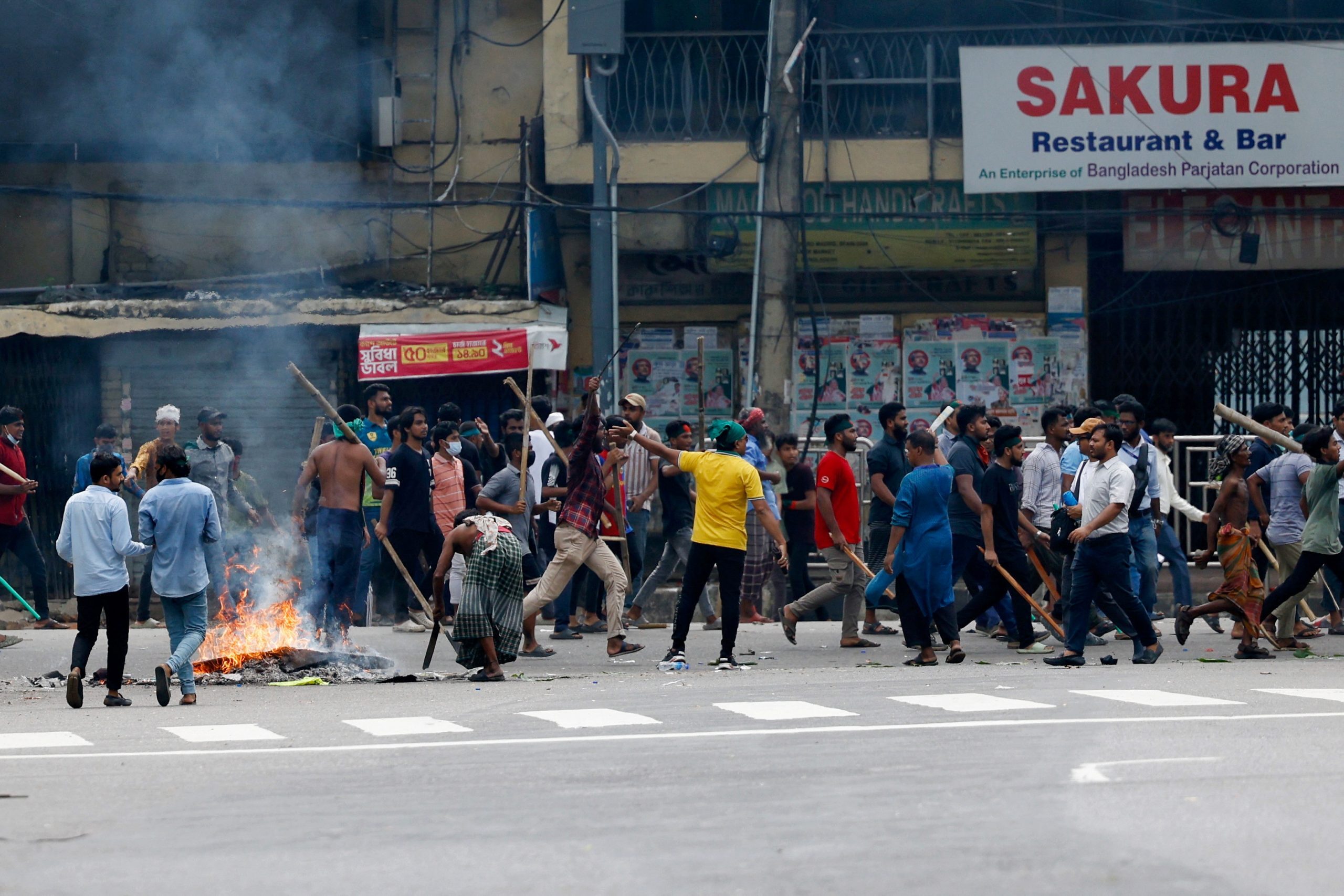
The fresh round of clashes erupted days after over 200 people were killed in violent clashes between the police and mostly student protesters demanding an end to the controversial quota system that reserved 30 percent of government jobs for relatives of veterans who fought in Bangladesh’s War of Independence in 1971. Since then, more than 11,000 people have been arrested.
Curfew Ordered
The situation prompted authorities to order a curfew in major cities and small towns across Bangladesh for an indefinite period from 6 PM Sunday, mobilising troops, paramilitary border guards BGB, and the elite anti-crime Rapid Action Battalion alongside police. The government ordered the shutdown of Meta platforms Facebook, Messenger, WhatsApp and Instagram. The mobile operators were ordered to shut down 4G mobile internet, the paper added. Prime Minister Hasina said that those engaging in “sabotage” across the country in the name of protest are not students but terrorists and asked people to suppress them with a firm hand. “I appeal to the countrymen to suppress these terrorists with a firm hand,” she said.
Indian Advisory
In an advisory on Sunday, the Ministry of External Affairs (MEA) said, “In view of ongoing developments, Indian nationals are strongly advised against travelling to Bangladesh till further notice. All Indian nationals presently in Bangladesh are advised to exercise extreme caution, restrict their movements and remain in contact with the High Commission of India in Dhaka through their emergency phone numbers: +8801958383679 +8801958383680 +8801937400591.”
Advisory for Bangladesh:https://t.co/mKs1auhnlK pic.twitter.com/m5c5Y0Bn8b— Randhir Jaiswal (@MEAIndia) August 4, 2024
UN ‘Shocked’
The United Nations’ human rights chief Volker Turk said Sunday the “shocking violence” in Bangladesh must end, as he urged the government to stop targeting peaceful protesters. “The shocking violence in Bangladesh must stop,” Turk said in a statement. “With a mass march on Dhaka planned for tomorrow, and the youth wing of the ruling party called up against the protesters, I am deeply worried that there will be further loss of life and wider destruction. “I appeal urgently to the political leadership and to the security forces to abide by their obligations to protect the right to life, and the freedom of peaceful assembly and expression.”
Top Meeting
Hasina called a meeting of the National Committee on Security Affairs – the highest policy-making authority of national security – at Ganabhaban, the paper reported citing sources from the Prime Minister’s Office (PMO). The meeting was attended by the chiefs of the Army, Navy, Air Force, police, RAB, BGB, and other top security officers. The meeting came as renewed violence spread to several parts of the country.
Giving details of casualties, the paper said eight people were killed in Feni, eight in Laxmipur, 22 including 13 policemen in Sirajganj, five in Kishoreganj, 11 in Dhaka, five in Bogura, three in Munshiganj, four in Magura, three in Bhola, four in Rangpur, three in Pabna, five in Sylhet, three in Cumilla, two in Sherpur and two in Joypurhat. One person was killed in one in Keraniganj, one in Savar, one in Cox’s Bazar, one in Barisal and one in Sreepur.
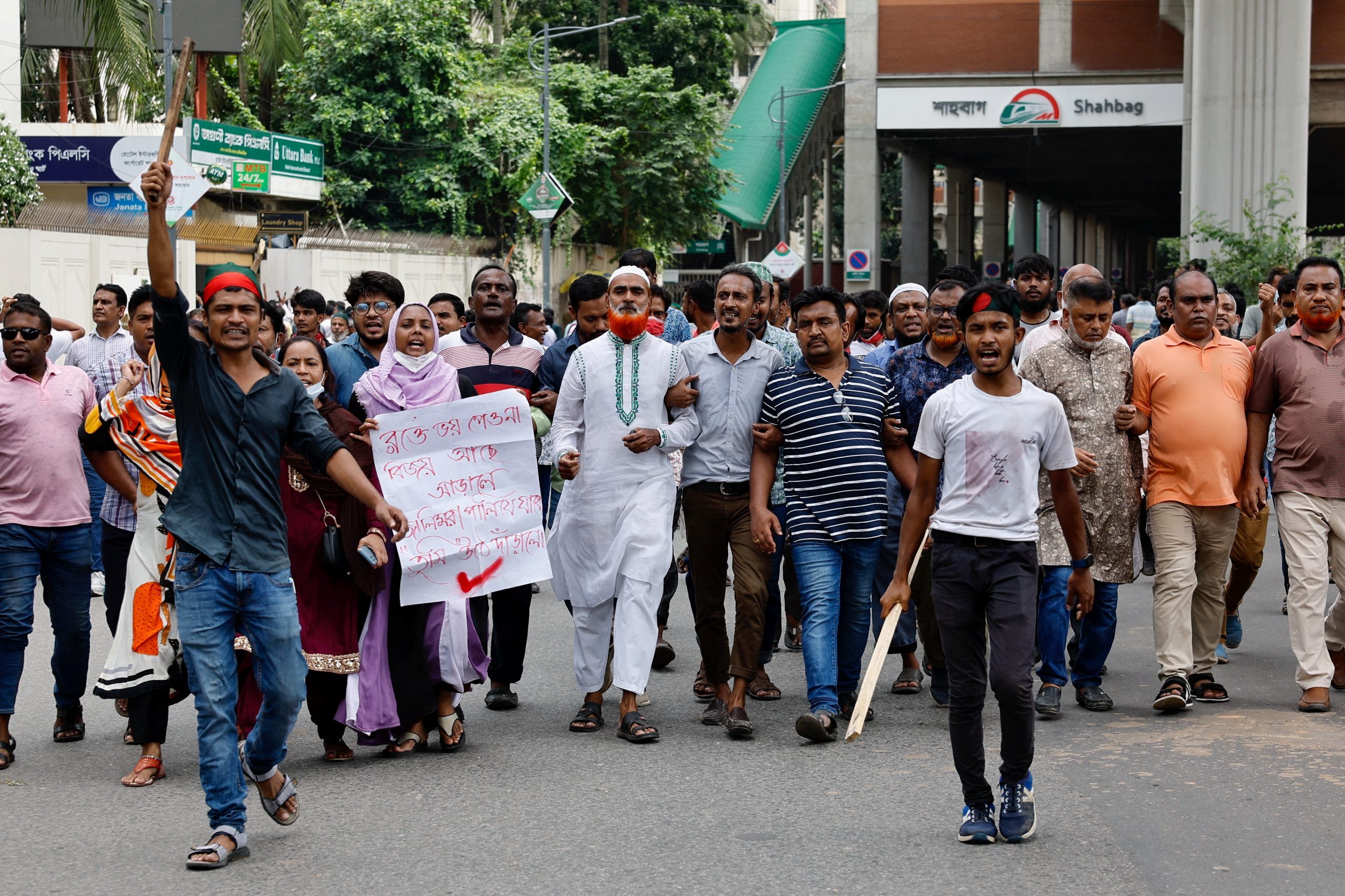
Awami League: Deaths and Injuries
Six Awami League leaders and activists were beaten to death and several others injured in a clash between the ruling party supporters and protesters in Narsingdi, according to local media reports. Most of the shops and malls in Dhaka were closed amid the protest. Hundreds of students and professionals had gathered at Dhaka’s Shahbagh, blocking traffic on all sides. Protesters had also gathered at the Science Lab intersection of the capital on the first day of the non-cooperation movement. They chanted anti-government slogans.
According to the Daily Star newspaper, several vehicles at Bangabandhu Sheikh Mujib Medical University (BSMMU) were torched on Sunday by unidentified people. People carrying sticks were seen vandalising private cars, ambulances, motorcycles, and buses on the hospital premises, triggering fear among the patients, their attendants, doctors and staff, the paper said. Nahid Islam, a coordinator of the anti-government protests, announced said they will stage a demonstration and mass sit-in on Monday to press home their one-point demand.
Meanwhile, the homes of several Opposition Bangladesh Nationalist Party (BNP) leaders, including Standing Committee member Amir Khosru Mahmud Chowdhury, were targeted. The BNP and its allies, along with numerous political, professional, and cultural groups have thrown their support behind the student-led movement that had been launched to demand reforms to quotas reserved for government jobs. Prime Minister Hasina offered to sit for talks on Saturday with the coordinators of the movement. However, they rejected her proposal.
(With agency inputs)
















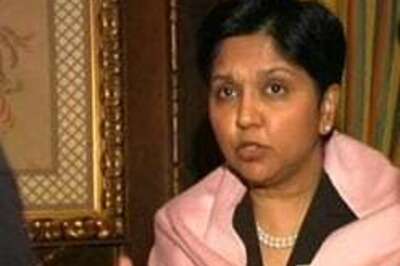

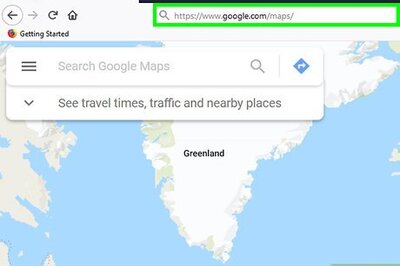
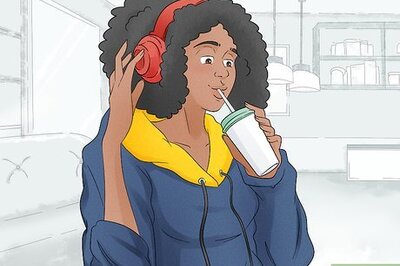
Comments
0 comment